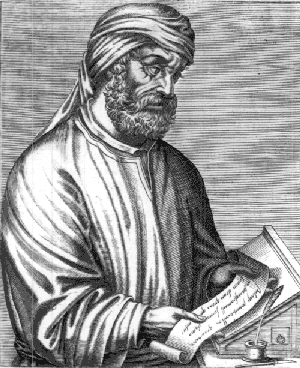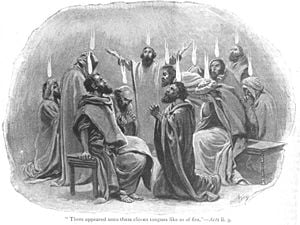 Montanus was the founder of Montanism, a schismatic movement of Christianity in Asia Minor (modern Turkey) and North Africa from [at least] the 2nd to the 6th centuries A.D. Other scholars believe this religious movement lasted well into the 9th century.
Montanus was the founder of Montanism, a schismatic movement of Christianity in Asia Minor (modern Turkey) and North Africa from [at least] the 2nd to the 6th centuries A.D. Other scholars believe this religious movement lasted well into the 9th century.
The Man of Phrygia
Little is known about the man named Montanus. Before his conversion to Christianity, he was purportedly a priest of the Oriental ecstatic cult of Cybele, the mother goddess of fertility. According to the 4th-century Church historian, Eusebius of Caesarea, Montanus entered into an ecstatic state and began prophesying in the region of Phrygia (now in central Turkey) around 172 A.D.
Montanus became the leader of a group of illuminati (or “the enlightened”), including the prophetesses Prisca and Maximilla, long before the Age of Enlightenment in the 18th century. The members of the illuminati exhibited the frenzied nature of their religious experience by enraptured seizures and utterances of strange languages that the disciples regarded as oracles of the Holy Spirit.
The Religion of Montanism
 Originally, Montanus declared that the Holy Spirit was giving new revelations to the Church, and named himself, along with two women (Prisca and Maximilla), as prophets.
Originally, Montanus declared that the Holy Spirit was giving new revelations to the Church, and named himself, along with two women (Prisca and Maximilla), as prophets.
This ancient prophetic development was expecting an imminent transformation of the world but later evolved into a sectarian movement claiming a new revelation. This religious movement held similar views concerning the basic tenets of Christianity, although the congregation believed in new revelations which were unapproved by the Christian Church as a whole. The emphases of the "new prophecy" seem to have been on resisting persecution, fasting, and avoiding remarriage, together with hostility to any compromise with sin.
Montanism, as a prophetic movement, called for a reliance on the spontaneity of the Holy Spirit and a more conservative personal ethic. Parallels have been drawn between Montanism and modern-day movements such as Pentecostalism and the New Apostolic Reformation.
 Montanism originated in Phrygia, a province of Asia Minor, and flourished throughout the local region, leading to the movement being referred to also as "Cataphrygian" (meaning it was "from Phrygia") or simply as "Phrygian".
Montanism originated in Phrygia, a province of Asia Minor, and flourished throughout the local region, leading to the movement being referred to also as "Cataphrygian" (meaning it was "from Phrygia") or simply as "Phrygian".
The epiphanic revolution spread rapidly to other regions in the Roman Empire at a time before Christianity was generally tolerated or legal. It persisted in some isolated places into the 6th century.
Convinced that the end of the world was at hand [and the New Jerusalem mentioned in the Book of Ezekiel in the Old Testament and the Book of Revelation in the New Testament was about to descend near the Phrygian village of Pepuza]. Montanus laid down a severe morality to purify Christians and detach them from their material desires. Official criticism of Montanus and his unorthodox movement consequently emphasized the new prophecy’s unconventional ecstatic expression and his neglect of the bishops’ divinely appointed rule.
Despite official disapproval and the failure of the world to come to an end, Montanism survived in the rural areas of Asia Minor. The earliest Christian inscriptions - outside the Catacombs of Rome - have been discovered in the valley of the Tembris River in Phrygia, dated by scholars to the middle of the 3rd century. A Montanist church with a full hierarchy survived until the 8th century. Its most significant figure, however, lived in North Africa.
 Tertullian, who converted to Montanism about 207, was a brilliant writer and the first important Christian to compose in Latin. This ancient scribe informed that, "the Spirit proclaimed no innovation in doctrine, but only gave instructions and directions about matters of Church discipline, which were coming to be the prerogative of the bishop." The response to Tertullian's edict was met with mixed emotions among the Church, who believed that prophecy was a genuine gift of God.
Tertullian, who converted to Montanism about 207, was a brilliant writer and the first important Christian to compose in Latin. This ancient scribe informed that, "the Spirit proclaimed no innovation in doctrine, but only gave instructions and directions about matters of Church discipline, which were coming to be the prerogative of the bishop." The response to Tertullian's edict was met with mixed emotions among the Church, who believed that prophecy was a genuine gift of God.
Some scholars believe Tertullian fiercely attacked those who condemned the 'new prophecy', especially the Church authorities who were more interested in their own political power in the Church than in listening to the Spirit. This is very much indicative to the Protestant reaction to Papal claims.
Eventually Montanism was ultimately condemned by the Bishop of Rome (also known as The Pope) and the Montanistic movement, which was declared as "heretical", was pushed out. This resulted in the excommunication of the adherents of Montanism by the Church.
Today, fragments of Montanist prophecies are preserved by Eusebius of Caesarea, in his Ecclesiastical History, which is available in several English translations.
For further reading about Montanus and Montanism, please visit the following pages:
The Development of the Canon of the New Testament
Montanism [2nd century heresy] Ancient Pentecostal History and Roots
`````````````````````````````````````````````````````````````````````````
For further reading about Montanus and Montanism, please visit the following pages:
The Development of the Canon of the New Testament
Montanism [2nd century heresy] Ancient Pentecostal History and Roots
No comments:
Post a Comment